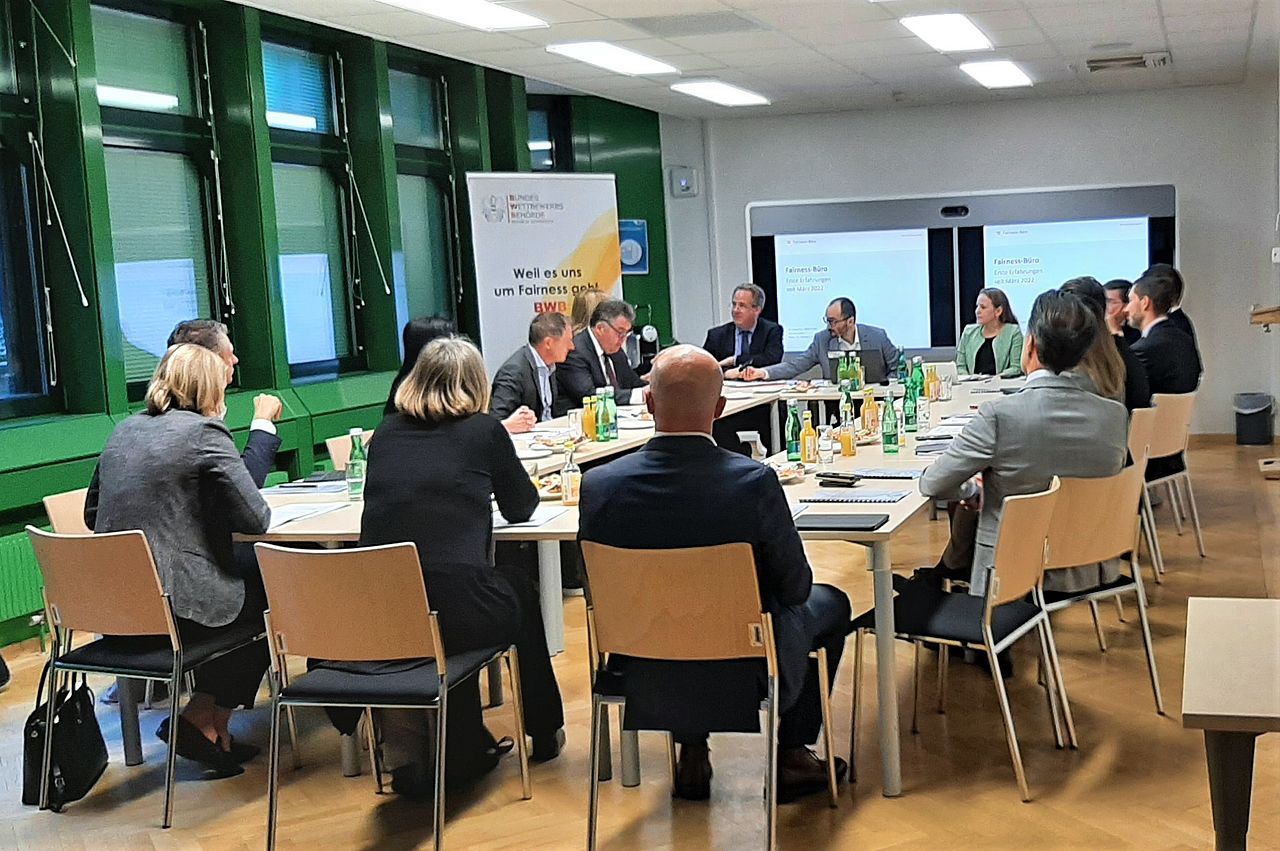With the EU Directive on unfair trading practices in business-to-business relationships in the agricultural and food supply chain now being fully applicable, the Austrian Guidance had to be revised accordingly. The Directive was transposed in Austria by way of the Fair Competitive Conditions Act (FWBG), with the AFCA being the authority in charge of enforcing the Act.
The revised Guidance for fair conduct in business was presented during a roundtable discussion on 25 October 2022.
Sector representatives invited
The AFCA invited the Agriculture Ministry’s Fairness Office, as well as sector representatives from the Austrian Retail Association (Handelsverband) and the Austrian Brand Association (MAV) to a presentation and discussion of its Guidance. Also represented were the companies Hofer, Metro Cash & Carry Österreich, Ottakringer Group, Brau Union, Lidl Österreich, Spar and Rewe Group.
The Fairness Office was set up at the Ministry of Agriculture, Forestry, Regions and Water Management on 1 March 2022. It is an autonomous and independent first point of contact, which looks into complaints of unfair and illegal trading practices in relation to the sale of agricultural and food products. It serves as a radar for fair competition along the supply chain. Complaints are handled absolutely anonymously, which is why the Office is highly regarded. Complainants may ask the Office to cooperate with the AFCA, even in more abstract cases such as when there are alleged clusters in certain industries or among certain market participants.
“Fairness in the market is an important parameter to ensure sustainable markets for both small and big businesses. Each and every market participant can help make the market fairer. Our Guidance for fair conduct in business may help companies recognise unfair practices and show them ways forward. It applies to all sectors,” says interim Director General Natalie Harsdorf-Borsch.
Guidance revised
A first version of the Guidance was published in 2018 when it became apparent that unfair business practices are often hard to counter with cartel law. Fear is another factor playing a key role, with businesses reluctant to disclose information on unfair business practices to the AFCA. The new version is intended to be used as a tool for compliance programmes, and to provide clarity on how to judge companies’ conduct and what exactly is meant by behaving fairly towards other market participants.
The revised version also includes an overview of key UTP provisions of the FWBG, including case studies and additional practical information, also considering relevant new provisions in the recent amendment to the Federal Cartel Act (KartG). The Guidance can thus continue to serve as a practical guide for businesses’ day-to-day dealings.
Inquiry into food sector launched
The AFCA has launched a sector inquiry into the food sector. The last inquiry into the food sector was completed in 2007. The current situation of rising prices, supply chain bottlenecks and increasing inflation make another more detailed analysis of the market from a competition perspective necessary.
“We at the Federal Competition Authority are closely observing the markets for everyday goods like food or heating. We are looking into the competition side of the current situation, analyse it in depth and will make recommendations, if necessary, to ensure that the food sector remains competitive,” explains interim Director General Natalie Harsdorf-Borsch.
As usual, the AFCA will cooperate closely with the second official party in the process, the Federal Cartel Prosecutor, using its knowledge for the analysis.
The inquiry will particularly focus on the following four key questions:
- Where in the supply chain have the increases in food prices in 2022 primarily ended up?
- How has product concentration developed within product categories and what has happened to the market share of own brands?
- In why way has competition in the food sector changed over the last few years?
- How does online retail, an increasingly significant factor, impact on competition within the food sector?
A micro basket of everyday commodities such as milk and bread, meat, fruit and vegetables, bottled beer as well as non-alcoholic drinks will be used as a basis for the inquiry
Guidance for fair conduct in business and launches inquiry 2022 (currently available in German only)

